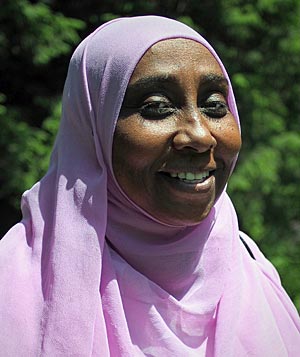Learning a language through CONTACT
February 27th, 2017 | SIT Graduate Institute
A conversation with Dr. Nawal K.N. Alamin
By James Heflin

As a resident of Sudan, Dr. Nawal K.N. Alamin has been close to conflict. In Khartoum, Alamin teaches soil science and watershed management at Sudan University for Science and Technology. Outside of that work, however, she is part of a peacebuilding group, which consists primarily of women. The group addresses issues of women’s rights as well as peacebuilding in general.
Alamin came to the United States as part of SIT Graduate Institute’s CONTACT program to increase the knowledge and skills she brings to that unofficial work.
Program Manager Mark Clark says Alamin’s dual role is typical of many CONTACT participants. “Someone might work for a bank by day, then work with child soldiers or women seeking sanctuary. They might work through churches or NGOs in a volunteer position. But it’s often something they want to be a future career.”
Most, he explains, would like to continue their work beyond the three weeks of CONTACT and go on to get a certificate or master’s degree from SIT. The number one difficulty such students face is financing that ongoing education. “Almost all are self-funded or it’s a patchwork,” says Clark. “They might get some help from their church or employer.”
Once they’re in the program, students participate in classes that often directly address their situations. In Alamin’s case, the thorny issues of conflict and resolution that the Sudanese still face are a matter for class discussion.
The convergence of perspectives and ideas in the CONTACT program helps, says Alamin. When it comes to armed groups attempting to talk about peace, she explains, “The language is not easy. They don’t have the language.”
But groups like Alamin’s are trying to teach that language. It’s a struggle in a country where approximately 1.5 million people have died in civil wars and the conflict in the Darfur region of Sudan continues.
The struggle that Alamin and others face – in peacebuilding, and in women’s rights – also occurs against a backdrop of religious differences. Alamin comes from the majority Muslim north of Sudan. The major religions of Southern Sudan, which gained independence in 2011, are Christianity and Animism.
The finer point Alamin puts on issues of women’s rights reveals the sorts of complications that activists face in the country. In a larger city like Khartoum, she says, women can advocate for themselves. Becoming a professor gained Alamin respect, as well. But cultural attitudes don’t make gaining that respect easy. “A lot of people think women are supposed to be raising children,” she says. “Women sometimes need self-confidence, and most of the time it’s not there.”
For her, however, there’s a clear demarcation between acceptable and unacceptable norms for women. “Before, we had the law that women travelling abroad have permission from their husband, their father or brother. Me, I like it,” she says. “I feel like it’s okay. But we have social laws that are not going with sharia law. I don’t like that. If it comes from sharia, I accept it.”
This year, CONTACT added an innovative elective to its three-week program, one with unique power to bridge divides. In collaboration with the organization Musicians Without Borders, CONTACT brought musicians to campus to learn how to facilitate music-making as a peacebuilding activity.
Other electives include classes in how to train trainers, as well as in peacebuilding and development.
Alamin, for her part, has found the diverse backgrounds of her fellow students a pleasure. “CONTACT is a good chance to share with [other students] my experience, and to share their experience,” she says. “It’s a practical way of helping yourself to be a peacebuilder.”
